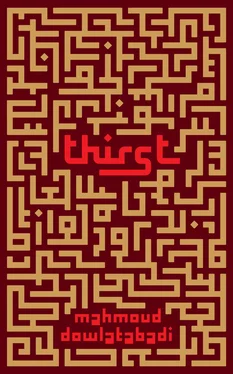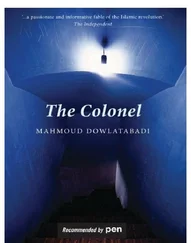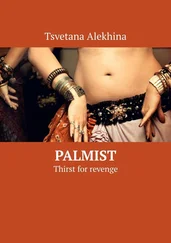From the mid-point of the film on, the camera returns to focus on the tawny-white face of the man, panning all around him and giving the impression that he is smiling. At the same time, the young woman is asked a very forthright question: ‘Was that the last time you saw your husband?’ — ‘Yes!’ And then the interviewer says: ‘If you don’t want to answer this question, you’re free not to. But if you’re willing … then here it is: between two circumstances, two stances, two moments and, so to speak, two points in time, within a short space of each other, for example, between the moment he arrived and the moment he said goodbye and left, which was more pleasant? His coming or his going?’
The young woman hesitates, but the screen of illusions does not give her time for pause or reflection, for thinking or for choosing the best moment, making it clear that the film has been edited at this point. All we can hear is the woman’s voice saying: ‘Sorry, I didn’t hear you! What was your question again?’
So he asks her again: ‘And this meeting … was it your final farewell?’
The photo on the shelf seems to be smiling more broadly than ever and then we hear a voiceover of the woman’s reply, played over a still image of the photograph of the man: ‘Yes … that was the last time.’
Wailing, the sound of mourning and images of green and red flags, and ranks of young men marching out into the desert. And the headbands, red and green, that are tied round the teenagers’ foreheads, like individual banners waving against the background of the earth and the monotonous desert, like a crescent moon torn into thousands of pieces, coloured in vivid green and red, moving patterns on the film’s background.
And the sound of mourning and the rhythm of hands beating on chests …
‘You never mentioned your husband’s name?’
‘No.’
‘Would you like to tell us his name?’
‘No.’
‘May I ask why not?’
‘He didn’t have a name. He didn’t want to have a name.’
‘Can I ask why not?’
‘You’d have to ask him yourself. He specified in his will that he wanted to remain anonymous.’
‘Thank you.’
‘Yes … thanks.’
* The figures named in this and the following paragraph were all early rebels against the encroachment of the Abbasid Caliphate into Persia. As such, their conflicts with the Baghdad-based authority prefigure the modern tension along the Iran — Iraq border.
† Khwaja Nizam al-Mulk Tusi.
‡ Circa AD 754.
§ A nonsensical word.
‖ Arabic, meaning ‘You? Can’t you hear?’
a Arabic, meaning ‘Thirst … thirst, O sir!’
b Itikaf is an Islamic practice consisting of dedicating oneself to a period of retreat in a mosque for the fulfillment of one’s request from God.
‘WELL, SABAH AL-KHEIR YA KATIB ! *What have you done about the report? I’ve been asked for a response by my superiors. They heard about this incident, and I’ve been given to understand that we can feature it in our international homeland propaganda programme. The more luridly we present it, the better. It has attracted a good deal of attention, and it’s important that material generated by us should catch the president’s eye. It’s a big deal; it could mean medals and honours for both you and us — drive a bit slower, will you, soldier! This gentleman isn’t used to riding in an army jeep. Slow down, I want to give us more time to talk — I’m eager to hear, Abu Alaa, most anxious to hear what you have to say. I’ve vetoed any TV or radio coverage of the incident. Not just because of the presence of Red Cross and all that … how can I put it? It’s because of the speed with which television’s immediate images instantly evaporate from people’s memories. I need a pen. The homeland is in need of your pen to record this incident. Even a short broadcast trailer to whet people’s appetites would benefit from the magic of your pen. The homeland, the president and the people are proud of the enchanting power of your pen. You and I both know — you probably better than I — that we need an appropriate subject to whip up tribal and national sentiment. In the past, you have successfully touched on many different topics with your pen. Whatever subject you’ve discussed has been a success. Of course, those triumphs are testament to your genius. And I personally have no doubt that this incident will furnish you with another opportunity to display your prowess at writing. Let’s just say the raw material has been supplied and is only waiting for a skilful chef to mix the ingredients and cook the meal. Yes … an adept master-chef is what’s required now!’
‘Why, thank you. I’ve been compared to lots of things, but never to a chef.’
‘I didn’t mean to offend you, sir, really I didn’t. I’m just a soldier. Let me try another comparison. This one’s more appropriate, honestly. Imagine soldiers, officers, orderlies, clerical units and artillery, combat regiments, infantry and other units all ready and waiting for their commander to issue the order to join together, form ranks, and march in unison. In particular, it’s vital that the artillery receives clear orders so that it moves at the right time and to the right place. Now, in this instance, you are the commander and everyone’s waiting on your command. You issue the order with a sweep of your hand or by uttering the word ‘Fight!’ So, commander, tell me what strategy you have devised for unleashing a story that I’m sure will explode with all the force of a cannon shell when it’s first broadcast? This explosive round under your command, our historic document, will be just one of the tens, even hundreds of similar pieces of information that we plan to deploy to discredit the enemy: a foe who fancies he has a monopoly on virtue and integrity in this conflict. We’ll target this supposed virtue and integrity of the enemy with your cannon, your pen! You’ll be glad to hear — I may have mentioned it earlier — that I’ve extracted confessions from those inexperienced teenagers. I can play you their confession on videotape, or you can speak to them yourself if you prefer. But in any event, suffice to say that we’ve made history today.’
‘Did you say history , Major? Did I hear you correctly?’
‘Yes, history, you heard me right. We’re engaged in another historic war with the enemy!’
‘I’m delighted to learn that you’re interested in history. Before this war, I was only concerned with contemporary news and stories. But for some time now I’ve been looking into the history of the tension between the Arabs and Iran. Of course, history usually reports animosities, wars and massacres, and ultimately, the defeat or victory of one of the sides involved. But on the margins of history, you come across some remarkable details that are worthy of note. So, a while ago, I decided to write a book that goes into all that history, all our victories and all the enemy’s tribulations and defeats. In your opinion, Major, wouldn’t that sort of work have a greater long-term impact?’
‘Katib … Katib … we’re talking as if we don’t understand each other’s language. Or is it that you can’t hear me, or haven’t listened to what I’m saying? Don’t you feel the same way as me on this question? I’m speaking in Arabic and your dossier shows that you’re an Arab, too. Unless your ancestors on your mother’s side were Kurds — and you know it would be quite a black mark against you if that were the case. You see, if it were deemed necessary to do a bit of digging in your file, it could lead to your enforced exile from the homeland. To spell it out for you, at best you would be cast adrift in foreign lands like most of your colleagues, and you wouldn’t be in such good shape as you are now. You get my meaning, I hope?’
Читать дальше












